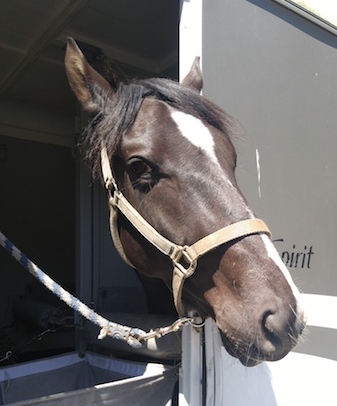Protect Your Horse Before and During Stress
by Beohringer Ingelheim Animal Health

Most competitive horses experience quite a few big changes in their lives. They will change barns, find new owners, work with different trainers and learn new skills or disciplines. Upsets in their routine can cause stress, which contributes to performance-robbing equine stomach ulcers.
“All the changes that come in a horse’s life can trigger health issues, including ulceration of the stomach lining,” says Sarah Reuss, VMD, DACVIM, Large Animal Veterinary Services, Internal Medicine, Boehringer Ingelheim Animal Health. “Ulcer prevention should be considered every time a horse’s routine is modified.”
A Plan for Ulcer Prevention
Ulcers can be caused by training, traveling, changing feed schedule, and social regrouping. To prevent ulcers, Reuss suggests that horse owners think about increasing grazing time, providing free access to hay and feeding as little grain as possible divided into multiple small meals, along with giving Ulcergard®(omeprazole), the only FDA-approved and proven ulcer prevention medication. Ulcergard, with its patented formulation that ensures the medication is absorbed correctly, will help protect your horse’s stomach lining during times of stress.
“Along with the countless other details horse owners have to take care of when starting a horse in a training program or moving to a new barn or owner, ulcer prevention needs to be part of the plan,” Reuss says. “It’s also important to remember to start Ulcergard 36 to 48 hours before the stressful event to allow it to reach the bloodstream to suppress the acid pumps in the stomach.”
Look for Signs of Ulcers
Equestrians will do everything they can to ensure whatever change is happening in their horse’s life goes smoothly. Beyond making sure their horse is settling in, Reuss says to also watch for signs of ulcers.
“It’s important to know what’s going on with your horse when they’re being integrated into a new program,” Reuss says. “This may lessen the chance of stomach ulcers causing performance issues that may derail training later on.”
Signs of ulcers include:
- Less-than-optimal (poor) performance, resistance to work, difficulty training
- Change in attitude for the worse
- Decreased or picky appetite
- Weight loss or poor body condition
- Recurrent colic
- Dull hair coat
Equine stomach ulcers can happen in as little as 5 days. If your horse is diagnosed with ulcers, you can start treatment without stopping training with Gastrogard® (omeprazole), the only proven and FDA-approved product containing specially formulated omeprazole that blocks acid production at the source for the treatment of gastric ulcers.
Some affected horses won’t show overwhelming signs of ulcers. Reuss says the only way to definitively diagnose stomach ulcers is to perform a gastroscopy, also known as a “scoping.” It provides the extra benefit to assess current stomach conditions and, if ulcers are present, grade them. If your veterinarian’s practice doesn’t have a scope, ask for a referral in the area.
Healthy as a Horse
Whatever the reason for a change in your horse’s routine, make sure they settle in. If your horse will experience a life change in the future, be sure to contact your veterinarian to ask for ways to help the transition go smoothly.
Originally Published August 2017 Issue

The Colorado Horse Source is an independently owned and operated print and online magazine for horse owners and enthusiasts of all breeds and disciplines in Colorado and surrounding area. Our contemporary editorial columns are predominantly written by experts in the region, covering the care, training, keeping and enjoyment of horses, with an eye to the specific concerns in our region.

